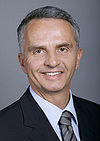
The Federal Council is the federal cabinet of the Swiss Confederation. Its seven members also serve as the collective head of state and government of Switzerland. Since after World War II, the Federal Council is by convention a permanent grand coalition government composed of representatives of the country's major parties and language regions.

The Christian Democratic People's Party of Switzerland, also called the Christian Democratic Party, Democratic People's Party and Swiss Christian Democratic Party, was a Christian democratic political party in Switzerland. On 1 January 2021, it merged with the Conservative Democratic Party of Switzerland (BDP/PBD) to form The Centre, which now operates at the federal level. The Christian Democratic People's Party will continue to exist at the cantonal level as individual local and regional parties determine their status. Its 28 seats in the National Council and 13 seats in the Council of States were transferred to the new party, as was its sole seat on the Federal Council, held by Viola Amherd.

Didier Eric Burkhalter is a Swiss politician who served as a Member of the Swiss Federal Council from 2009 to 2017. A member of FDP.The Liberals, he was President of the Swiss Confederation in 2014.

In Swiss politics, the magic formula is an arithmetic formula for dividing the seven executive seats on the Federal Council among the four coalition parties. The formula was first applied in 1959. It gave the Free Democratic Party, the Catholic Conservative Party and the Social Democratic Party two seats each, while the Party of Farmers, Traders and Independents received one seat.
On December 12, 2007, all seven members of the Federal Council, the government of Switzerland, were elected by the joint chambers of the Federal Assembly for the 2008–2012 term of office. Councillors are elected individually by an absolute majority of votes, with the incumbent councillors defending their seats in descending order of seniority.

The Conservative Democratic Party of Switzerland was a conservative political party in Switzerland from 2008 to 2020. After the 2019 federal election, the BDP had three members in the National Council.
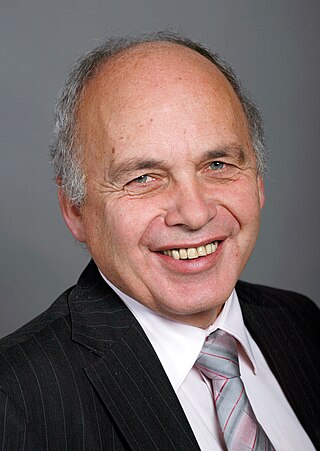
On 10 December 2008, the Swiss Federal Assembly elected Ueli Maurer as successor to Federal Councillor Samuel Schmid. Schmid resigned on 12 November 2008 after a number of controversies, officially citing health and personal reasons. Maurer took office on 1 January 2009.
Two by-elections to the Swiss Federal Council were held in Switzerland on 22 September 2010, after federal councillors Moritz Leuenberger (SP) and Hans-Rudolf Merz announced they would step down from the Federal Council towards the end of the year. The by-elections resulted in the elections of Simonetta Sommaruga from the SP and Johann Schneider-Ammann from the FDP, resulting in no change in the partisan composition of the council. It also resulted in the first majority of women on the Federal Council in its history, with Sommaruga joining Micheline Calmy-Rey, Doris Leuthard and Eveline Widmer-Schlumpf.
An election for all seven members of the Federal Council, the government of Switzerland, was held on 14 December 2011, following the federal election on 23 October 2011. Micheline Calmy-Rey announced she would not run for re-election to the council. According to a traditional informal convention, the successor has to come from the French-speaking or Italian-speaking part of Switzerland. The candidates for her post announced by their respective cantonal sections are Alain Berset (Fribourg), Pierre-Yves Maillard (Vaud), Stéphane Rossini (Valais), and Marina Carobbio (Ticino).
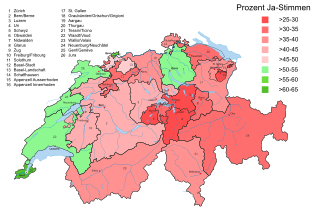
A referendum was held in Switzerland on 13 February 2011 on the federal popular initiative "For the protection against gun violence". It was rejected by 56% of voters and a majority of cantons.
Elections were held to the Council of States of Switzerland in October and November 2007 as part of the 2007 federal election. All 46 members of the Council of States were elected from all cantons of Switzerland. The first round was held on 21 October. In eight cantons, not all seats were filled in the first round, and a second round was held on 11 November, 18 November, or 25 November.

Walter Thurnherr is a Swiss government official who served as Chancellor of Switzerland from 2016 to 2023. Although he holds a traditionally nonpartisan office, he was elected as a member of the Christian Democratic People's Party (CVP/PDC). When it merged with the Conservative Democratic Party (BDP/PBD) to form The Centre (DM/LC) in 2021, Thurnherr joined the new party.
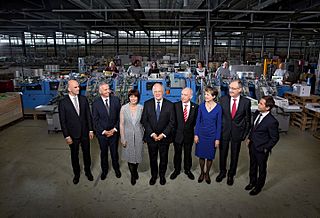
An election for all seven members of the Federal Council, the Government of Switzerland, was held on 9 December 2015, following the federal election on 19 October 2015, for the 2016–2020 term.
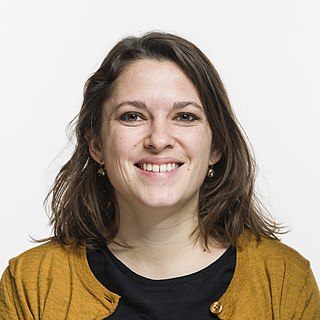
Mattea Julia Meyer is a Swiss politician who currently serves as member of the National Council (Switzerland) for the Social Democratic Party since 2015. Concurrently she co-chairs the Social Democratic Party of Switzerland together with Cédric Wermuth. Previously, Meyer served on the Cantonal Council of Zürich from 2011 to 2015.
An election for all seven members of the Federal Council, the Government of Switzerland, was held on 11 December 2019, following the federal election on 20 October 2019, for the 2020–2024 term.
The 2003 Zürich cantonal elections were held on 6 April 2003, to elect the seven members of the cantonal Executive Council) and the 180 members of the Cantonal Council.
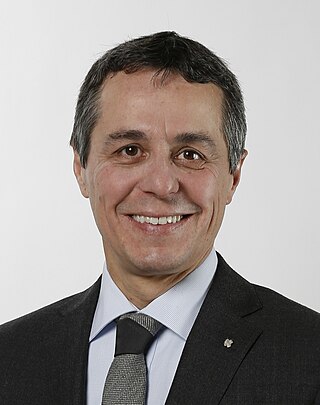
A by-election to the Swiss Federal Council was held on 20 September 2017, after federal councillor Didier Burkhalter (FDP-NE) announced he would leave the Council effective 31 October 2017. The by-election resulted in the election of Ignazio Cassis (FDP-TI), resulting in no change in the partisan composition of the council.
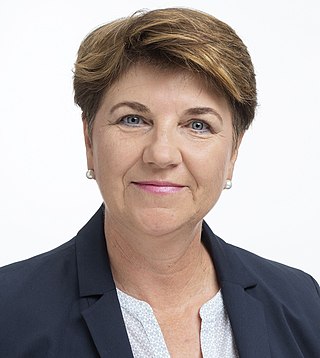
By-elections to the Swiss Federal Council were held on 5 December 2018, after federal councillors Johann Schneider-Ammann (FDP-BE) and Doris Leuthard (CVP-AG) announced in September they would leave the Council effective 31 December of the same year.

The 2019 Zürich cantonal elections were held on 24 March 2019, to elect the seven members of the cantonal Executive Council and the 180 members of the Cantonal Council. All five incumbents running were re-elected to the Executive Council, as well as green candidate Martin Neukom and Swiss People's Party candidate Natalie Rickli.

The 2023 Zürich cantonal elections were held on 12 February 2023 to elect the seven members of the cantonal Executive Council and the 180 members of the Cantonal Council.

